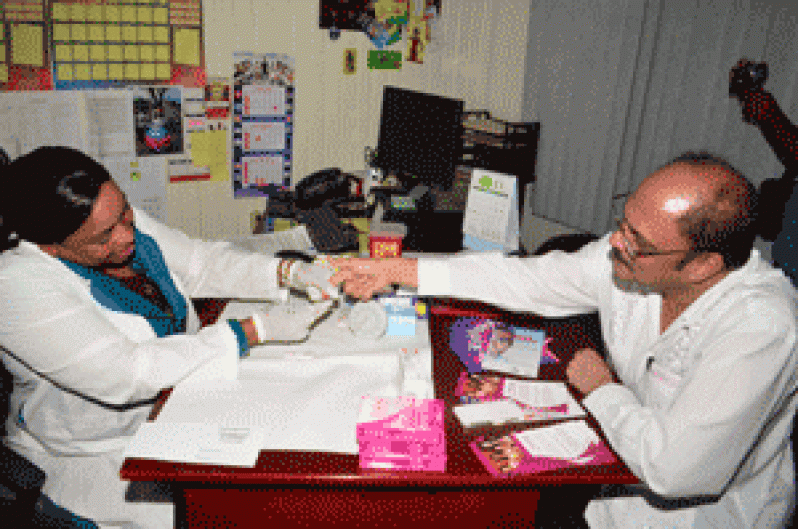THE National AIDS Programme Secretariat (NAPS) last Friday launched its National Week of Testing at its headquarters located at Hadfield Street and College Road in Georgetown, with Health Minister Dr. Bheri Ramsaran and goodwill ambassadors being the first to get tested.
 The goodwill ambassadors, who all embrace the Health Ministry’s AIDS programme and who are intended to be role models for the youths of Guyana, were Dr. Vivian Mitchell, Ms Guyana Renaissance 2012; Ms. Soyini Fraser, Miss Guyana Universe 2012; Miss United Nations 2012 and Mr. Winston George, Olympic runner.
The goodwill ambassadors, who all embrace the Health Ministry’s AIDS programme and who are intended to be role models for the youths of Guyana, were Dr. Vivian Mitchell, Ms Guyana Renaissance 2012; Ms. Soyini Fraser, Miss Guyana Universe 2012; Miss United Nations 2012 and Mr. Winston George, Olympic runner.
They, in turn are urging young people to get tested for HIV, and to engage in positive lifestyles as would prevent the spread of HIV.
In her opening remarks, Dr. Shanti Singh, Programme Manager of the National AIDS Programme Secretariat, thanked the role models for stepping out and leading in the initiative.
Dr. Singh, who noted that Guyana’s HIV response began in 1987 and evolved over the years to the point where Guyana now embraces the concept of “Treatment as Prevention” and has been pursuing this robustly said voluntary counselling and testing (VCT) has remained one of the key cornerstones for the programme.
During last year, some 48,000 persons were treated for HIV.
How it is done
Persons presenting themselves to be tested for HIV will be counselled before and after being tested. If the person is found to be HIV negative (meaning that he/she does not have HIV), NAPS will work with the individual on all of the risk reduction strategies, so as to ensure he/she remains negative.
On the other hand, if the person is HIV positive, the counsellors/testers will work with that person to ensure they get into a Treatment and Care Programme where they can get managed appropriately, which is also an approach to preventing new infections.
Dr. Singh would like to assure the general public of the following: That the NAPS testing team would perform at the highest standards; that quality would not be compromised, and that confidentiality would be of the strictest and highest level as persons get tested.
And these will be monitored on an ongoing basis throughout the testing initiative, she assured.
She explained that the circumstances under which VCT staff work when conducting such initiatives are different from regular testing circumstances, since a lot of what is done over this period will be outreaches and mobile testing – taking the service to the community. “We will be taking VCT to workplaces, places of gathering, market places, the City Mall and places where we can actually reach people, allowing them to come forward and get tested,” Dr. Singh emphasized.
Importantly, Dr. Singh announced, NAPS has reduced the number of days for the testing initiative from five (5), as obtained over the last five years, to three days. The testing initiative on this occasion will run from November 29, and will continue over November 30 and December 1st, and will be conducted under the theme: “Getting to Zero.” That in effect aims at: Getting to zero stigma, zero discrimination and zero new infections and AIDS-related deaths.
The local theme this time around will be: “Zero Stigma; Get Tested”, and NAPS will begin its work this year in some of the high-risk populations with which they work.
Meanwhile, Health Minister Dr. Bheri Ramsaran, who joined in thanking the good-will ambassadors for supporting the initiative, stressed the importance of having good role models for our young people, so as to effect behavioural change in the fight against HIV/AIDS.
He commented that the HIV epidemic has now transformed from being an emergency to a manageable chronic disease, and he credited the hard work of those working with HIV and those in treatment and care, complying with the guidelines established for the uptake of HIV medication.
But despite such breakthroughs, a high premium is being placed on preventing new HIV infections; and in this regard, VCT cannot be under-emphasized. He stressed that even though HIV does not discriminate on the basis of race, religion, age, social status, the most vulnerable population has always been found to be the young people. Therefore, the Health Ministry will be partnering with various personalities or entities as would have a positive impact on the lifestyles of young people.



.jpg)








